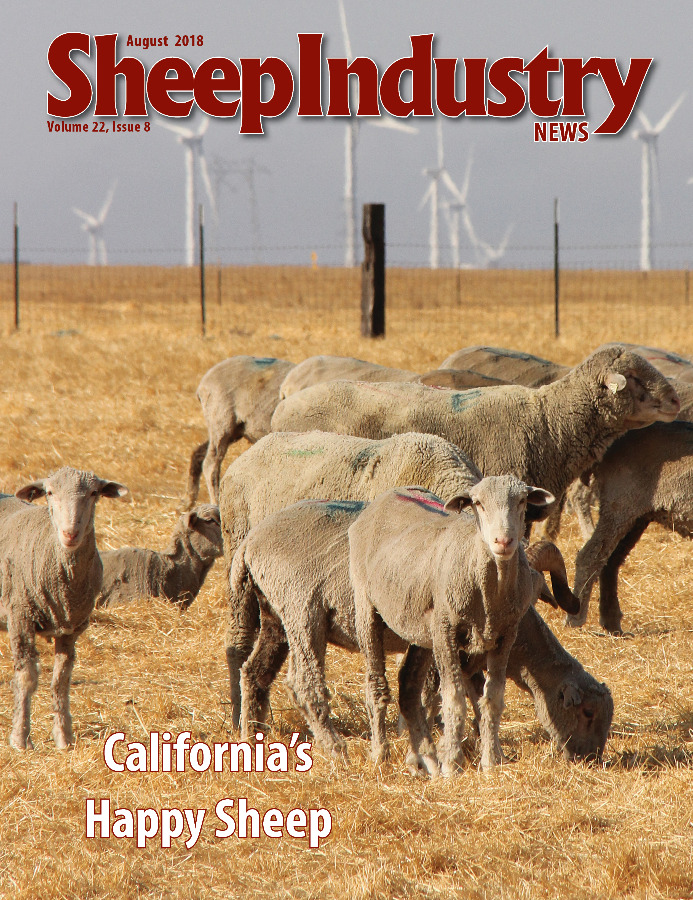
- August 2018
- President’s Notes
- Jerry King Cartoon
- ALB White Paper Calls for Industry Changes
- Japan Reopens to American Lamb
- Ninth Circuit Court Hears Montana Grazing Appeal
- Superior Farms Looks for Innovation in the Sheep Tank
- San Francisco Lamb Jam
- Fear Mongering & The Wild Sheep Foundation
- Around the States
- Market Report
- The Last Word
To View the August 2018 Digital Issue — Click Here

Taking a Closer Look at International Trade
Mike Corn, ASI President
I hear from quite a few sheep producers interested in restricting lamb imports. Given all the media coverage of the White House and trade these days, it makes sense that people would want to look at options for preventing the flood of frozen product from Australia and New Zealand.
I have been very interested in this exact topic myself, and in fact, I asked Secretary of Agriculture Sonny Perdue back in March about tariffs on imported lamb. I have quizzed ASI Executive Director Peter Orwick and lobbyist Jim Richards numerous times as I seek opportunities for market relief.
Fortunately for ASI, Orwick led the only successful trade action ever implemented on both Australian and New Zealand lamb, and he has great experience in trade disputes and contacts in the legal firms specializing in trade action. I asked him to relay the key points.
No new trade controls have been added in the United States to address imports
The president is exercising his authority to protect national security of the United States by imposing tariffs on such products from most countries. The president has ordered protections for steel and aluminum (Section 201) and most recently imposed tariffs on Chinese goods due to their unfair trade practices related to the forced transfer of American technology and intellectual property (Section 301).
• Trade actions allowed under United States law include Section 201 – often called the escape clause – with temporary import protection while the business or industry implements a plan to be competitive with imports. This is the type of trade action ASI won in 1999. Only three have been successfully done since then, with two being the ones just announced by the Trump administration. Nearly 20 years, and only three cases in that time frame.
• Trade law allows Section 301 – often referred to as anti-dumping cases. An industry or business would file such a case to prove imports were causing injury and seek restrictions. Orwick considers injury as the critical determination in these cases. Since the trade is lamb meat, the financial and marketing information to show injury would depend on proprietary business data of lamb companies.
This was true in 1998, as well, in the trade action led by ASI. Then, Iowa Lamb Company was a key player in supplying information for the case. Foreign governments and meat importers appealed the case to the World Trade Organization, which ruled in 2001 that the United States was not in compliance with trade law as the injury demonstrated weighed too much on farmer and rancher documentation and did not sufficiently show meat company damage. Major American lamb companies would need to lead the charge in filing trade actions.
Lastly, trade law does provide options where significant subsidies exist in the import dispute. Australia and New Zealand export lamb and claim little government subsidization.
A point that I find very concerning about trade law is the lack of opportunity for the United States Congress to address issues with imports. The United States joined the World Trade Organization in the early years of the Clinton administration and our government has been taken to task numerous times since by other countries with appeals to the WTO. Essentially, if Congress wrote and approved trade restriction legislation outside of the trade case categories described above, the exporting countries would go to the WTO and likely succeed in appeal.
It might not be too big a stretch to think the President might want out of the WTO.
I hope this explanation helps with questions on United States trade law, and I encourage you to visit with your members of Congress and share with us any direction they provide to address unregulated imports.
Also on the trade front, we finally won access for American lamb to the Japanese market. Japan did millions in trade with our lamb companies until the cattle BSE hit in 2003. All ruminant animal product trade from the United States was halted and it took nearly 15 years to get the access restored, even though lamb was collateral damage from the beef issue.

